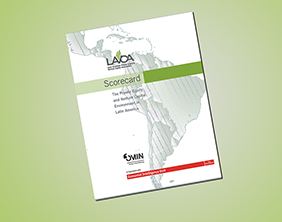Overview
The key takeaway for the 2010 edition of the Annual Scorecard on the Private Equity and Venture Capital Environments in Latin America and the Caribbean is that of ongoing progress in the operating environments for private equity and venture capital (PE/VC) in the twelve countries in the study.
While Chile and Brazil continued to dominate the rankings, placing first and second respectively, half of the countries monitored in the report posted improved private equity and venture capital (PE/VC) environments this year, consolidating a five-year trend of overall gains.
Mexico posted significant gains in the 2010 Scorecard, moving into third place in this year’s ranking, followed closely by Colombia and then Uruguay to round out the top five.
This year’s Scorecard also saw the region’s top markets tightening the gap with developed markets used to benchmark the Latin American countries. Chile’s overall score is now tied with Spain, with Brazil just one point behind. Both Brazil and Mexico rank above Taiwan, with Colombia just one point behind the country.
The annual Scorecard ranks business environments for PE/VC activity on a scale of 1-100 (with 100 being the most investment friendly). The environments in the region continue to vary considerably. Chile received the highest score in the region with 76, with the Dominican Republic ranked last at 38. Of the 12 countries, eight continued to score a 50 or above, the same as in 2009.
The 2010 Scorecard was produced in collaboration with the Economic Intelligence Unit, with support from the Multilateral Investment Fund and the Andean Development Corporation. It ranks 12 countries based on the following indicators:
- Laws on VC/PE fund formation and operation
- Tax treatment of VC/PE funds and investments
- Protection of minority shareholder rights
- Restrictions on institutional investors in making VC/PE investments
- Protection of intellectual property rights
- Bankruptcy regulation (encompassing bankruptcy procedures/creditor rights/partner liability in cases of bankruptcy)
- Capital market development and feasibility of local exits (ie, initial public offerings)
- Registration/reserve requirements on inward investments
- Corporate governance requirements
- Strength of the judicial system
- Perceived corruption
- Use of international accounting standards and quality of the local accounting industry
- Entrepreneurship


